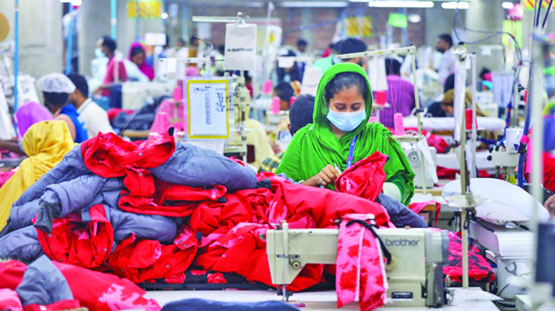RMG exports increasing in non-traditional markets
Staff Correspondent: About 84 percent of Bangladesh’s total export earnings come from the garment industry. However, the country’s apparel market is US-Europe centric. As a single country, the largest market for Bangladeshi garments is the United States. Entrepreneurs are leaning towards new or unconventional markets by reducing their dependence on Europe-America. Various initiatives have been taken to expand non-traditional markets to avoid over-dependence. The government is also giving cash assistance at the rate of 4 percent to exports. All in all, the non-traditional clothing market is becoming popular day by day.
According to the sector concerned, the speed of export to non-traditional markets is also consistent. Exports are increasing despite the adverse global conditions. In the first quarter (July-September) of the current fiscal year 2023-2024, exports to non-traditional markets have increased compared to other markets. The confidence of exporters is also increasing in these countries. The government’s cash assistance to entrepreneurs and exports is encouraging the expansion of non-traditional markets.
BGMEA and BKMEA, the two organizations of the owners of the ready-made garment industry, say that currently the most common and main markets of the country are the European Union (EU), the United States and Canada. Exports of garments are high in these markets. Countries outside these markets are seen as non-traditional or emerging markets. Exports to non-traditional markets include Japan, Australia, China, Russia, UAE, Korea and India.
According to BGMEA and Export Promotion Bureau (EPB) data, exports to non-traditional markets in the first three months of the fiscal year have increased by nearly 25 percent over the same period of the previous fiscal year (2022-23). During this time, the amount of export was $224.24 million. Exports to the United States, the country’s main market, increased by 2.77 percent during the discussed period. And exports to the main market EU (27 countries) increased by 11.47 percent. As such, exports to new markets are consistently increasing.
When talking about this, Bangladesh Apparel Exchange (BAE) Managing Director Mohiuddin Rubel said, BGMEA has established regular contact with diplomats and traders in non-traditional markets. Regular participation in local fairs and exhibitions is being provided in these markets. This encourages the garment industry entrepreneurs of the country.
This industrial entrepreneur said that now China has withdrawn from many markets. They are withdrawing themselves from some markets. There, Bangladeshi entrepreneurs are gaining confidence in those markets. China moved away from Japan. Bangladesh is trying to fill the gap created there. Thus, opportunities have been created in unconventional markets. Exports are also increasing and will increase further in the future.
Among the 18 non-traditional countries that export the most ready-made garments is Japan. Whereas exports increased by more than 39 percent in the first three months of the fiscal year. Exports to Japan are about $450 million worth of clothing. The second major market for non-traditional is Australia. Where exports increased at a higher rate than Japan. Exports to Australia increased by 54 percent. There is continuity in exports even in this unconventional market. During the discussed period, a total of $34.47 crore worth of garments were exported to the country. However, exports to non-traditional markets in India fell by 8 percent in the last quarter. $28 million worth of apparels have been exported to the Indian market.
In this regard, BGMEA President Farooq Hasan said, “We have asked for the creation of new sources even before taking charge of BGMEA. That’s how I worked. We have also done branding of Bangladesh clothes in different countries with diplomatic cooperation.
He said, we are focusing on non-traditional markets. There is an opportunity to increase exports. The government is giving incentives to export to these markets. It also has continuity in exports to non-traditional markets.
Rare Israeli airstrike in Beirut kills Hezbollah commander and more than a dozen others
International Desk: Israel launched a rare airstrike that killed a senior Hezbollah milita…








